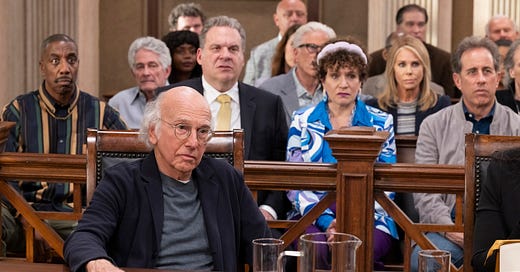
Ladies and gents, Curb Your Enthusiasm is finished. The final episode of its twelfth and final season aired on Sunday, and now it’s time for Larry David to gallop off into the sunset—or onto the golf course.
Apparently, I’m qualified to give my thoughts because my brand’s shorts were featured in episode three. In one of those Curb scenes that never gets old, Larry squeezed his long balls into our premium cotton (well, 50 percent cotton if I’m being honest).
Minds like Mel Brooks, Groucho Marx, Woody Allen, and yes, Larry David transcend award shows and fickle audiences. They’re not imprisoned in the zeitgeist like White Lotus and Euphoria. Frasier might have won 37 Emmys, but when was the last time anyone besides your shrink referenced it? But Larry endures, because few comedians distill social complexities in such an easy, mostly palatable way.
Larry finds the big thing, the universally important issue, and then focuses on the smaller thing inside it: the problem within the problem. Most of us agree that the stuff in the news—racism, Israel/Palestine, climate change—is out of any one person’s control. But within all of these issues are things people can control. One might even call these smaller, immediate choices. . . life.
It’s not that Larry is oblivious to the big problem—but he’s wise enough to know that it’s useless and unsettling to obsess over it. Larry may not see eye to eye with the Palestinians on every issue, but he can definitely appreciate their chicken. It’s good chicken!
And in the latest season of Curb, he’s worried about people getting thirsty when they stand in direct sunlight, rather than about the opaque laws that discourage the distribution of water. So he ends up on trial for handing out water.
The jury is duped into trying to answer the wrong question: Is Larry David a malignant asshole? The real one is: Why are there complicated, inhumane rules preventing simple things? Larry goes out doing what he has been doing for twelve seasons: fighting against arbitrary rules in favor of the people right in front of him.
Larry is not just a nonconformist; he’s also a humanist. When he picks up a prostitute so he can use the carpool lane, he doesn’t see her as a prostitute. He sees a person he can pay for a different kind of service, and who is an entertaining addition to the passenger seat. (Larry kinda stole this bit from Woody Allen’s Deconstructing Harry. Woody is also a humanist in his own way.) In other words, the crime of prostitution is debatable; what matters in that moment is that Larry can get along the highway quicker, thanks to a prostitute.
Call it Zen and the Art of Larry David, this instinct to make things right now a little better. When someone spills grape juice all over the table during the seder and a lady screams at Larry to “get a sponge,” Larry fires back, “why don’t YOU get a sponge?” That’s his point. Get a sponge! Don’t bitch about the big stuff when there’s little stuff to bitch about right in front of your face. Don’t like climate change? Buy a Prius and shut up!
We can all learn from Larry how to make today more meaningful. Don’t sweat the big stuff; focus on what you can control. Eat the chicken. Get a sponge.
Larry, thank you for your service. Everyone else: don’t forget to buy the shorts.
Follow Noah Rinsky on Instagram @oldjewishmen, subscribe to his Substack, and read his Free Press piece “When Your Dog Pays the Mortgage.”
Become a Free Press subscriber today:
















I could never watch more than 5 minutes of this show without developing this itch to smash Larry in the face before I gouge my eyes out. Clearly it’s me.
This is a beautiful homage, and I've watched every episode of Curb Your Enthusiasm. But Frasier was a masterpiece, and I reference it all the time!